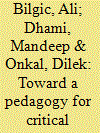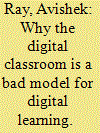|
|
|
Sort Order |
|
|
|
Items / Page
|
|
|
|
|
|
|
| Srl | Item |
| 1 |
ID:
050645


|
|
|
|
|
| Publication |
Hampshire, Palgrave Macmillan, 2003.
|
| Description |
xi, 266p.Hardbound
|
| Standard Number |
1403964157
|
|
|
|
|
|
|
|
|
|
|
|
Copies: C:1/I:0,R:0,Q:0
Circulation
| Accession# | Call# | Current Location | Status | Policy | Location |
| 047762 | 370.9/NEL 047762 | Main | On Shelf | General | |
|
|
|
|
| 2 |
ID:
161938


|
|
|
| 3 |
ID:
085715


|
|
|
|
|
| Publication |
2008.
|
| Summary/Abstract |
The field of media development, as an intervention in conflict-affected societies, is both growing, and divided. This article identifies and discusses some emerging divisions in the sub-field of journalist training. On the one hand is a 'modernisation' approach, geared towards the implantation of western-style precepts and methods for reporting conflicts. On the other is a critical pedagogical approach intended to enable participatory media development. In the latter, 'minority world journalism' is effectively problematised, especially around assumptions about the role of the journalist vis-a--vis conflict and whether it is proper, permissible and/or practically possible for editors and reporters to set out to contribute to peace. The contestation this divide has occasioned partly recapitulates the UNESCO media debate of the late 1970s and early 1980s. The concept of peace journalism is now attracting attention, both as a form of critical pedagogy in journalist training and as a potential rallying point for reviving calls for structural reform in the world information and communication
|
|
|
|
|
|
|
|
|
|
|
|
|
|
|
|
| 4 |
ID:
122649


|
|
|
|
|
| Publication |
2013.
|
| Summary/Abstract |
The promise of Elizabeth Dauphinee's The Politics Of Exile lies most prominently in its ability to exile us from an international relations scholarship trapped in an economy of colonial truth. It is this economy of colonial truth, also readable as Europe, that produces an international relations scholarship and pedagogy that not only self-consciously cleanses the academic world of other ways of learning and knowing but also induces an indifference or an instrumental orientation in its recipients. Reading Dauphinee's text alongside the transcript of a child detainee's interrogation in Guantánamo Bay as well as Chinua Achebe's Things Fall Apart, this article explores the ethical relations of responsibility that emerge as Dauphinee's novel sets out to move writers, researchers, and teachers of international relations away from an economy of colonial truth.
|
|
|
|
|
|
|
|
|
|
|
|
|
|
|
|
| 5 |
ID:
160971


|
|
|
|
|
| Summary/Abstract |
International relations has increasingly paid attention to critical pedagogy. Feminist, postcolonial, and poststructuralist international relations scholarship, in particular, have long been advancing discussions about how to create a pluralist and democratic classroom where “the others” of politics can be heard by the students, who then can critically reflect upon complex power relations in global politics. Despite its normative position, critical security studies has so far refrained from joining this pedagogical conversation. International relations scholars in critical security studies can contribute to the production of a critical political subject in the “uncomfortable classroom,” one who reflects on violent practices of security. Three pedagogical methods will be discussed here: engaging with the students’ lifeworlds, revealing the positionality of security knowledge claims, and opening up the classroom to the choices about how student agency can be performed beyond the classroom. The argument is illustrated with reference to international relations and politics students’ perceptions of Syrian refugees in Turkey. The article advances the discussion in critical international relations pedagogy and encourages critical security studies scholarship to focus on teaching in accordance with its normative position.
|
|
|
|
|
|
|
|
|
|
|
|
|
|
|
|
| 6 |
ID:
186304


|
|
|
|
|
| Summary/Abstract |
The pandemic has compelled educational institutes across the world to hastily adopt, adapt and cope with digital learning by developing ‘digital classrooms’, virtual learning environments replete with sophisticated technological features. The eagerness of the intent to ramp up technological infrastructures, however, is not reflected in the rethinking or redesigning of pedagogies for digital learning. Technocratic ambitions often have very little, if anything, to do with pedagogy. Moreover, the digital classroom is ‘global’ by design, and the ethnocentric framework wrought upon by such designs impedes the decolonizing of the curriculum. It depletes local pedagogic cultures: local histories and cultures, political and moral economies. This article argues that imagining the digital classroom a-temporally and a-culturally, typically from a technocratic point of view, signals a tryst with (techo-)orientalism in its new avatar.
|
|
|
|
|
|
|
|
|
|
|
|
|
|
|
|
|
|
|
|
|